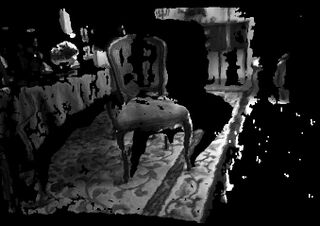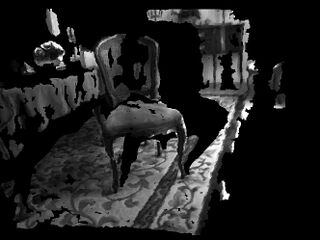Example Disparity Smoothing
From BoofCV
Jump to navigationJump to search
Stereo disparity is notoriously noisy after often post processing steps need to be applied before it can be used. One of the more common steps is to remove small regions which are disconnected from their neighbors. This is also called speckle removal. Future post processing filters for stereo disparity are planned which "should" be even better.
Example Code:
Concepts:
- Stereo Disparity
- Filtering
Related Examples:
Example Code
/**
* Stereo disparity images can be very noisy and often times post processing to reduce the
* noise is desired/required. This example demonstrates ones of the most basic ways to remove
* noise by removing speckle. In this case, speckle are small regions with incorrect disparities.
* The filter works by removing all small regions which have a significantly different
* disparity from their neighbors.
*
* @author Peter Abeles
*/
public class ExampleStereoDisparitySmoothing {
static int disparityRange = 60;
public static void main( String[] args ) {
String calibDir = UtilIO.pathExample("calibration/stereo/Bumblebee2_Chess/");
String imageDir = UtilIO.pathExample("stereo/");
StereoParameters param = CalibrationIO.load(new File(calibDir, "stereo.yaml"));
// load and convert images into a BoofCV format
BufferedImage origLeft = UtilImageIO.loadImage(imageDir, "chair01_left.jpg");
BufferedImage origRight = UtilImageIO.loadImage(imageDir, "chair01_right.jpg");
GrayU8 distLeft = ConvertBufferedImage.convertFrom(origLeft, (GrayU8)null);
GrayU8 distRight = ConvertBufferedImage.convertFrom(origRight, (GrayU8)null);
// rectify images
GrayU8 rectLeft = distLeft.createSameShape();
GrayU8 rectRight = distRight.createSameShape();
// Using a previous example, rectify then compute the disparity image
RectifyCalibrated rectifier = ExampleStereoDisparity.rectify(distLeft, distRight, param, rectLeft, rectRight);
GrayF32 disparity = ExampleStereoDisparity.denseDisparitySubpixel(
rectLeft, rectRight, 5, 10, disparityRange);
// Let's show the results in a single window before speckle is "removed"
var gui = new ListDisplayPanel();
gui.addImage("Before", VisualizeImageData.disparity(disparity, null, disparityRange, 0));
gui.addItem("Before 3D",
ExampleStereoDisparity3D.computeAndShowCloud(param, rectLeft, rectifier, disparity));
// Here's what we came here for. Time to remove the speckle
var configSpeckle = new ConfigSpeckleFilter();
configSpeckle.similarTol = 1.0f; // Two pixels are connected if their disparity is this similar
configSpeckle.maximumArea.setFixed(200); // probably the most important parameter, speckle size
DisparitySmoother<GrayU8, GrayF32> smoother =
FactoryStereoDisparity.removeSpeckle(configSpeckle, GrayF32.class);
smoother.process(rectLeft, disparity, disparityRange);
gui.addImage("After", VisualizeImageData.disparity(disparity, null, disparityRange, 0));
gui.addItem("After 3D",
ExampleStereoDisparity3D.computeAndShowCloud(param, rectLeft, rectifier, disparity));
// Notice how in the "After 3D" view the number of randomly floating points is much less?
ShowImages.showWindow(gui, "Disparity Smoothing", true);
}
}

